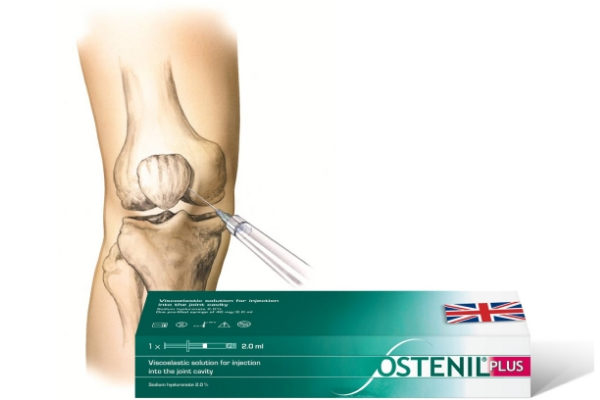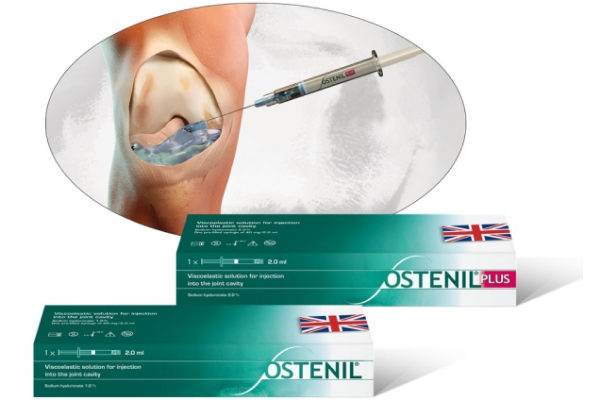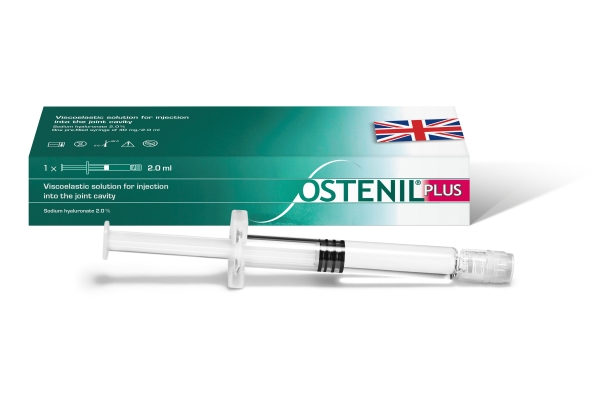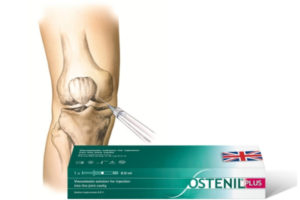
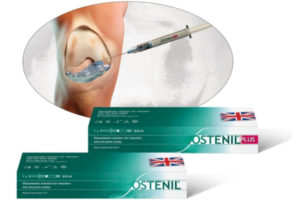
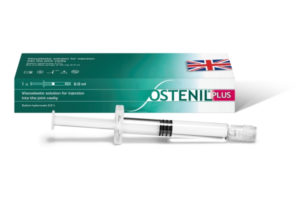
Injection Therapy at Physiocare
Physiocare offers an injection therapy service provided by highly trained and specialist physiotherapists. They are dual trained both as registered physiotherapists and have additional qualifications in the clinical use of Steroid and Ostenil (Hyaluronic acid) injections.
We offer both Corticosteroid and Ostenil injections, which are suitable for a range of conditions. Your physiotherapist will assess you and advise you of the most appropriate treatment for you and your condition.
Corticosteroid “steroid” Injections
What are Corticosteroid “steroid” Injections?
Steroid injections are used to treat swollen or painful tissue and joints such as occur in arthritis and tendinitis. By helping to control inflammation and pain they make movement easier and enables a return to more normal function. There is extensive research showing that steroid injections provide improved and longer lasting pain control than standard oral medication.
Corticosteroids are well tolerated by the body and do not cause the typical side effects commonly associated with taking oral steroids or anabolic steroids.
What conditions are suitable for injection?
Steroid injections can be helpful in the treatment of arthritic joints such as the knee. It is also effective for:
- frozen shoulder
- carpal tunnel syndrome
- trigger finger
- localised soft tissue inflammation such as tendinitis and bursitis
Booking and Cost
To book a steroid injection call our normal reception 0118 934 4055 and ask to book an appointment for an injection. Or Book Online!
Book now or Book a Free Phone Consultation
If on the day the decision is made not to proceed with the injection you will only be charged the normal clinic assessment fee.
Steroid Injection cost (including cost of steroid):
- Single injection: £250.00
- Two injections: £475.00
Frequently Asked Questions
Please don’t hesitate to get in touch if you have any further or more specific queries – our receptionists will be only to pleased to help!
What are steroids?
Corticosteroids are manufactured versions of hormones that are produced by the adrenal glands.
How do they work?
When corticosteroids are injected into a joint or muscle they can help relieve inflammation in the nearby area. This can help relieve pain and stiffness.
What are the drugs used?
The most commonly used steroid drugs are hydrocortisone. They are often administered with a local anaesthetic called Lidocaine.
How are they given?
The injection is given into your joint (intra articular injection). It is administered with a local anaesthetic called Lidocaine. This will give immediate pain relief, which will last a few hours and can help with diagnostic confirmation.
Are they painful?
You may notice increased discomfort in the joint immediately following the injection but this should ease over the following few days.
How many injections am I allowed to have?
We recommended no more than 2 injections to the hip, knee and ankle joints in the space of 12 months and no more than 3 injections per year in other parts of the body.
How quickly will they work?
This will depend upon the type of steroid used. The shorter acting soluble steroids begin to give relief within a couple of hours. The longer acting steroids may take up to a couple of weeks to become effective.
How long with they last?
This will depend upon a number of factors including the nature and severity of the problem for which you are having the injection. Sometimes there is no improvement but the longer lasting less soluble steroids can be effective for many months. It is important you listen to the advice of your physiotherapist and continue with the exercise programme and make any lifestyle changes he or she recommends.
Can I drive straight after the injection?
We recommend you arrange to have somebody collect you from the clinic following your injection. If this is not possible we suggest you wait in the clinic reception for 30 minutes before driving.
Are there any side effects?
There is a low incidence of side effects following a steroid injection and these may depend upon where the steroid is injected and what type of steroid you receive.
Adverse reactions may include:
- Pain or discomfort for a few days in the injected area.
- A flushed complexion
- Temporary bruising or a collection of blood under the skin
- A rise in blood sugar which is more likely for those with diabetes
- An infection causing redness swelling and pain
- Paler skin at the injection site
- Risk of tendon rupture
- Loss of fat at the injected area
- Anaphylaxis
Can I go straight back to work?
If you feel able to, it is fine to return to work immediately. However if your job is manually demanding you should aim to reduce your workload for a few days.
Can I drink alcohol?
Yes, there is no reason to avoid alcohol after receiving a steroid injection.
Can I have a steroid injection if I am taking other medication?
Yes however if you are taking anticoagulation drugs (a medication that thins your blood) you must inform your physiotherapist before proceeding with the injection as there may be a risk of increased bleeding. Careful planning regarding your dose and the timing of the injection can mitigate this risk.
What should I do if I have diabetes?
You should inform the physiotherapist prior to your injection and carefully monitor your insulin levels for 48 hours following a steroid injection.
Will I still need to do my exercises?
Yes, it is important that you continue with the exercises prescribed by your physiotherapist.
OSTENIL® PLUS Injections
What is OSTENIL® PLUS?
Ostenil Plus is a solution containing hyaluronic acid which is the key component of synovial fluid which is the substance found in our joints that naturally protects the joint surfaces where the bones meet. It has been developed specifically for the treatment of osteoarthritis and helps to decrease pain and stiffness and improve the other symptoms commonly associated with osteoarthritis. It is administered as a single injection by a qualified clinician using aseptic techniques.
What joints are suitable for Ostenil Plus Injection?
Ostenil Plus can be used in any synovial joint (see information on osteoarthritis and synovial joints below). Most typically the knee, hip or shoulder joints but it is also suitable for the ankle, elbow and some of the smaller joints.
Booking and Cost
To book an Ostenil injection call our normal reception 0118 934 4055 and ask to book an appointment for an injection. Or Book online.
Book now or Book a Free Phone Consultation
If on the day the decision is made not to proceed with the injection you will only be charged the normal clinic assessment fee.
OSTENIL® PLUS Injection cost:
- Single injection: £350.00
- Two injections: £675.00
Frequently Asked Questions
Please don’t hesitate to get in touch if you have any further or more specific queries – our receptionists will be only to pleased to help!
Is there any evidence that Ostenil Plus works?
The Cochrane Review is internationally recognised as the benchmark for high quality information about the effectiveness of healthcare, including interventions for prevention, treatment and rehabilitation. Their review of the use of viscosupplementation for the treatment of osteoarthritis of the knee supports the use of HA (hyaluronic acid) products in the treatment of mild to moderate osteoarthritis of the knee.
Read the Cochrane Review in detail.
There are many clinical studies supporting the use of hyaluronic acid in various joints affected by osteoarthritis.
Does Ostenil Plus have any side effects?
Ostenil Plus has been extensively tested and has not been found to have any serious side effects. As it does not contain any animal proteins it is unlikely to cause an allergic reaction.
How often should I have an Ostenil Plus injection?
When the effects of your injection begin to wear off you are able to have another injection, typically this would be every 4-6 months.
How long will the effects of Ostenil Plus injection last?
Although you may not feel the benefit of the injection straight away, your pain and stiffness should gradually ease over the weeks following the injection and the improvement in your symptoms should last for several months.
Is Ostenil Plus suitable for me?
You should always consult a qualified clinician, your GP, Physiotherapist or Consultant. Nobody else is qualified to give you medical advice.
Cingal®
What is Cingal® Injection?
CINGAL injections are becoming an increasingly popular treatment for patients suffering from knee osteoarthritis and other joint issues that impact cartilage health. At the Physiocare Twyford, we understand the importance of exploring non-surgical options that can provide significant relief and improve the quality of life for our patients. This article aims to demystify Cingal injections, detailing what patients can expect in terms of procedure, recovery, and outcomes.
Understanding Cingal Injections
Cingal is a cutting-edge treatment that combines hyaluronic acid with a corticosteroid to address joint pain and inflammation directly. Hyaluronic acid is a natural substance found in the body that lubricates and cushions the joints, while corticosteroids provide fast-acting relief from swelling and discomfort. This dual-action formula is designed to offer both immediate and sustained relief from joint pain.
How the Injection Works
The procedure involves a single injection into the affected joint, where Cingal works to restore the natural balance of hyaluronic acid, improving joint lubrication and reducing friction. The corticosteroid component quickly reduces inflammation, offering rapid pain relief.
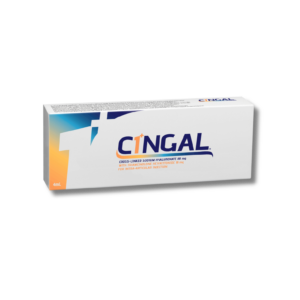
After the Injection: What to Expect
Immediate Aftercare
Patients may experience mild soreness or swelling at the injection site, which typically subsides within a few days. It’s generally advised to rest the joint and avoid strenuous activities for 24-48 hours post-injection to allow the treatment to settle.
Recovery Time
Most individuals can resume their daily activities shortly after the procedure, with no significant downtime required. Any discomfort from the injection itself is usually minimal and manageable.
Time Taken for the Injection to Be Effective
The corticosteroid component of Cingal provides relief from pain and inflammation often within a few days of the injection. The hyaluronic acid’s lubricating effects build over time, with many patients reporting gradual improvements in joint movement and comfort over the following weeks.
Potential Side Effects
While Cingal injections are generally safe and well-tolerated, as with any injection, there’s a small risk of side effects such as:
- Temporary injection site pain
- Swelling or bruising
- Stiffness in the joint These symptoms are usually mild and resolve on their own. Serious side effects are rare but should be discussed with your healthcare provider.
Who Will Benefit from Cingal Treatment?
Cingal is particularly suited for patients with knee osteoarthritis looking for relief from joint pain and inflammation. It may also be beneficial for those with other joint issues where lubrication and inflammation are contributing factors to their discomfort.
Other Important Information
- Duration of Relief: The effects of a Cingal injection can last for up to six months, varying from person to person.
- Repeat Injections: If beneficial, repeat treatments are possible. It’s important to discuss the timing and frequency of repeat injections with your doctor.
- Complementary Therapies: Combining Cingal injections with physical therapy and lifestyle adjustments can enhance overall outcomes and joint health.
Arthrosamid®
What is Arthrosamid®?
Arthrosamid® is a new type of treatment for knee osteoarthritis that offers you an effective alternative to the currently available therapies like steroid injections or knee replacement surgery. Based on an innovative non-biodegradable hydrogel technology, Arthrosamid® is 97.5% water, with 2.5% being a cross-linked polyacrylamide backbone. When injected into the knee Arthrosamid® cushions the joint and reduces pain, providing safe and sustained pain relief, all with one injection.
Am I suitable for Arthrosmaid injection?
Osteoarthritis
What is Osteoarthritis?
Osteoarthritis is a degenerative disease that causes pain and stiffness in the joints. It is the most common type of arthritis in the UK. Joints are exposed to a constant low level of damage in everyday life and usually the body simply repairs itself. With osteoarthritis however the protective cartilage that protects the end of the bone breaks down faster than they are repaired, causing pain, swelling and stiffness when moving a joint.
The exact causes are not known but several factors are thought to increase your risk of developing osteoarthritis, including:
- Joint injury and or over using a joint when it has not had enough time to heal after injury or surgery.
- Other conditions (secondary arthritis) – osteoarthritis can happen in joints severely damaged by a previous or existing condition, such as rheumatoid arthritis or gout.
- Age – your risk of developing osteoarthritis increases as you get older.
- Family history – osteoarthritis may run in families, although studies have not identified a single gene responsible.
- Obesity – being overweight puts excess strain on your joints especially those that bear the most weight such as your hips and knees and feet.
- Being a woman – osteoarthritis is more common in women than men.
Almost any joint can be affected by osteoarthritis but the condition most often causes problems in the hips and knees and in the small joints of the wrist and hand.
Three Stages of Osteoarthritis
- The early signs of osteoarthritis are often a slight stiffness after a period of immobility such as first thing in the morning or after you have sat for a while.
- In the middle phase the joint will become increasingly stiff and more painful when trying to move it
- In the final phase the joint may become inflamed and can be painful even at rest.
Treating Osteoarthritis
Osteoarthritis is a chronic condition for which there is currently no cure. However there are several simple methods of slowing down the progress and helping to control and even improve the condition.
In the early stages of the condition regular low impact exercise such as walking weight control, suitable footwear and specialised braces to support and protect the joint can be helpful.
Ostenil is one of the medications available to help control the symptoms of osteoarthritis. In addition to physiotherapy it can improve pain, swelling and improve range of motion at the joint so enabling the individual to remain more active and maintain muscle strength.
If you think you may have osteoarthritis we would advise you consult a specialist physiotherapist who can advise you on the best course of treatment for you.
Synovial Joint
A synovial joint is one that allows for movement such as the shoulder, hip and knee. Where the bones meet the surface is covered with a layer of cartilage and a thin layer of synovial fluid that separates and lubricates the two surfaces of the joint protecting the cartilage form wear and tear. The most important component of synovial fluid is hyaluronic acid.
In healthy joint there is a balance between the breakdown of the hyaluronic acid and the production of new. In osteoarthritis the breakdown exceeds production, which leads to a lack of hyaluronic acid. When this occurs the synovial fluid stops functioning effectively so causing the cartilage and bone to wear down more. This results in the symptoms of pain, swelling and stiffness associated with osteoarthritis.
Book your Injection Therapy today – call 0118 934 4055 Book now or Book a Phone Consultation




